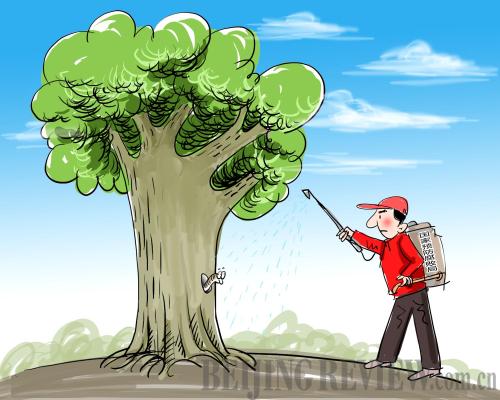|
 |
|
National Bureau of Corruption Prevention of China (CFP) |
The Communist Party of China's (CPC) Central Commission for Discipline Inspection (CCDI) had a busy year in 2009 as it worked to fight corruption.
At CCDI's annual work review press conference on January 7, Deputy Secretary Gan Yisheng recited a list of achievements: 2,231 Party members across China had been stripped of their membership and referred for prosecution for embezzlement or bribery from January to November 2009; almost 14,000 commercial corruption cases were investigated and handled by disciplinary and supervisory organs, of which about 21 percent involved civil servants; discipline inspection bodies received almost 1.32 million petitions and tip-offs during the same period, about 11 percent of which were tentatively verified and 8.75 percent were placed on file for investigation and prosecution; and at least 15 ministerial- or provincial-level officials, including heads of state-owned enterprises (SOEs), were investigated for corruption.
While these figures shed light on a big year for China's national disciplinary and supervisory organs, another statistic shows the large amount of work still needing to be done. China ranked 79th in 2009 on a corruption index of 180 countries and regions monitored by Transparency International, a Berlin-based non-governmental organization.
"The fight against graft and the promotion of clean and honest work among Party members has great bearing on the Party's survival," Huang Zongliang, a professor at Peking University, told Xinhua.
When CCDI convened its plenary meeting on January 12, Chinese President and General Secretary of the CPC Central Committee Hu Jintao told members that the Party should "fully recognize the situation of the fight against corruption," which is "persistent, complicated and arduous."
The CCDI communiqué that resulted from that meeting pledged to fight corruption with new tactics—increasing monitoring of officials' family members, supervising SOE executives and seeking whistleblowers on the Internet in 2010.
Asset declaration
Party organs at all levels are to carefully administer officials' family asset declarations to prevent them from abusing power, taking bribes or participating in other illegal activities, said the communiqué.
The CPC promulgated the family asset declaration regulation in 2006, by which Party officials were obliged to report information such as employment conditions, real estate and investments of their spouses and children.
A Peking University study at the end of 2008 said more than 10,000 corrupt Chinese officials had fled to North America and Europe over the past decade, taking with them more than 650 billion yuan ($95.6 billion) in illegal income.
An editorial in the Commercial Times newspaper said the asset declaration regulation has yet to yield its full potential due to the governments' failure to publicize officials' family and asset information to the public. The newspaper is based in Shenyang, northeast China's Liaoning Province.
The article said that at pilot programs in Xinjiang Uygur Autonomous Region and Zhejiang Province, the information on officials was either partly publicized or kept within their government departments. Only the full exposure of officials' assets can make effective social monitoring possible, the article said.
Commercial bribery
China's discipline and government watchdog also pledged to tighten supervision over SOEs and fight corruption among their executives.
"We will push hard to investigate and punish corruption in the restructuring, mergers, property transactions, capital operations and construction projects of SOEs," said Vice Minister of Supervision Qu Wanxiang at a meeting in Beijing on January 7.
Since it launched nationwide anti-commercial bribery campaigns in 2006, China has seen a string of serious corruption cases in SOEs that have included senior management of some of the country's largest corporations.
Liao Ran, Transparency International's Senior Program Coordinator for Asia Pacific, told Beijing Review that an important factor behind China's less-than-satisfactory ranking on his organization's annual list is that multinational corporations have engaged in commercial bribery in developing countries, where they are less likely to face prosecution.
Zhu Xiaoqin, head of the Beijing People's Procuratorate's Anti-corruption Bureau, told China Daily that corruption and bribery cases involving officials connected to major engineering projects in Beijing have grown by 31 percent annually since 2006.
Zhu said SOE-related cases account for the majority that involve briberies of 100,000 yuan ($14,700) and above, with real estate companies being the main culprit.
Internet watchdogs
The CCDI communiqué also encouraged more public participation in anti-corruption efforts and pledged to improve the disciplinary organs' ability to collect and research public complaints of corruption by officials that have been lodged over the Internet.
On October 28, 2009, the CCDI and the Ministry of Supervision launched a national informant website, www.12388.gov.cn, to record tips from netizens all across the country.
| 